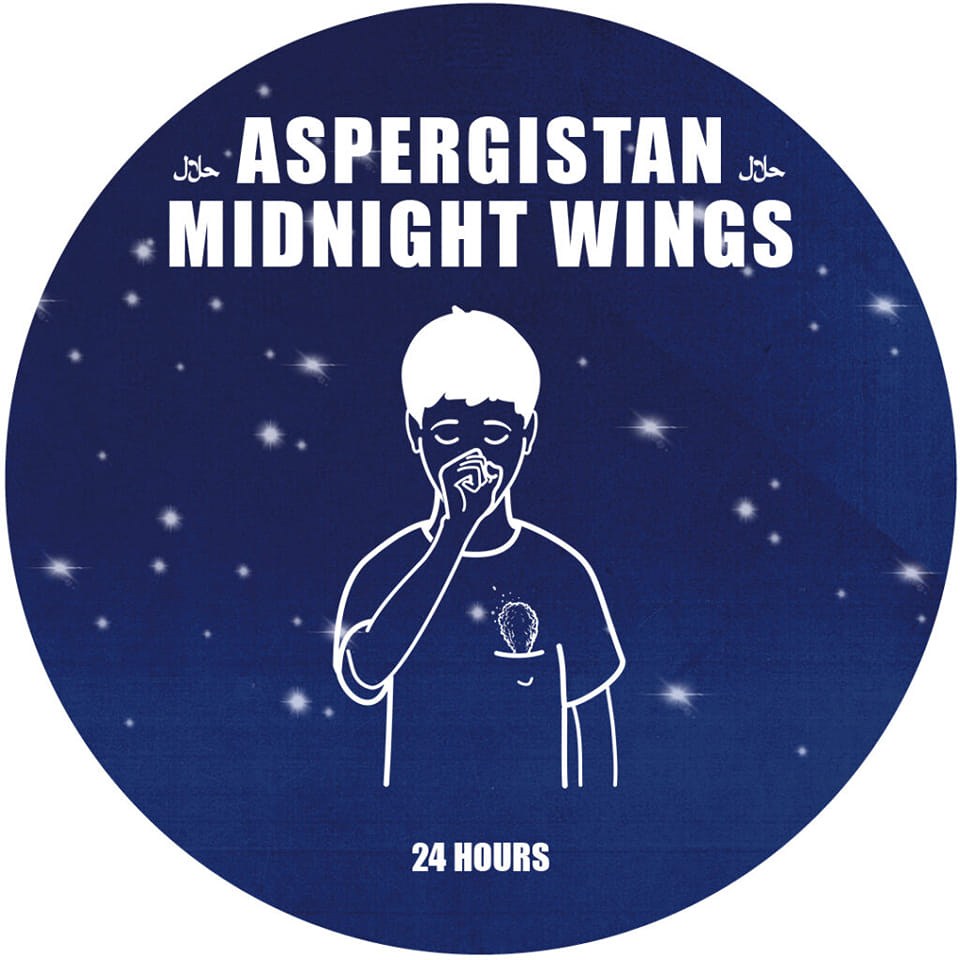Interview with Hamja Ahsan
Anna Lina Litz: Can you tell me about the program you are curating for the Radical Accessibility Studium Generale 19 march at the Rietveld Academy?
![]()
![]()
Hamja Ahsan: My book Shy Radicals has inspired a trail of other artworks, other collectives around the world which take concepts from the book and vocabulary. Among these is the artist Ipek Burçak, who's from Turkey and based in Germany. The utopic homeland I imagined, called Aspergistan, makes an appearance in her book The Autistic Turn. Ipek was based in Kassel in Germany and just wrote to me randomly. So it's not the case that I'm curating or commissioning, it's sort of self-generative, almost cellular. Sarah Browne made this beautiful film called Echo’s Bones set in the landscape of Ireland with younger people with autism and she's got a story from Samuel Beckett, rereading Samuel Beckett via neurodiversity, which I find quite interesting. We'll be speaking together about all the landscapes which appear in all these various works. There's taking landscapes in the imaginary way, in the virtual way…
![]()
AL: I have the book [Shy Radicals] here and I've been reading it over the past days. I recognize a lot of the resentments that you describe in it, especially after graduating from university and realizing I have to market myself and all that. I was wondering, because a lot of art institutions are starting to work with neurodivergence as a topic and we've also been doing it for three years. You have a section about curating a film program in the book, but how do you imagine cultural events and talks to ideally look in Aspergistan?
![]()
HA: I don't fit into some of the social networking of contemporary art. I generally don't go to private viewings, I don't like opening Ceremonies, the sort of ostentatiousness of big biennials… Aspergistan has existed in me probably since the days of playground bullying and imagining in your heart that there could be another place. I find the aspect of the noisy playground sort of reoccurs in other places and also hierarchies. The book presents a serious utopic constitution, but within that it also draws on the language of teen movies. I re-watched old Winona Ryder films and 80s teen movies to look at the power structures, and those replicate themselves in the art world. There is a mean girls table in the art world. I was attracted to art because I liked the silences of galleries and this self-absorption, something that was outside of the noisy playground. You'll see it again in Sarah's film, when the children engage in parallel play. They walk around the basketball court in their own ways and find those torturous and depressive aspects of the high school experience which also replicate themselves in the art world and the workplace.
AL: I was also thinking in a very practical sense, since we are organizing an event, a talk, how do we do it right so that it's actually a pleasant experience?
HA: I think it will be nice because of the space, with the cats, that automatically makes it different.
![]() white in conversation with Hamja
white in conversation with Hamja
AL: This event will not be about Shy Radicals. You proposed Trauma, solidarity and chicken as the topic.
![]()
![]()
HA: I was in documenta15 and it was probably one of my most repressive experiences racially and institutionally. There are still many unresolved problems within German society around McCarthyism and repression and xenophobia, and all that came together in documenta. I feel like my side of the story has never been fully told. There was an attempt to create a counter-hegemonic narrative of documenta15 at Framer Framed in Amsterdam where I was spoken about but wasn't allowed to speak for myself, so I find that ethically wrong, and the bits where they spoke about me were also cut from the online publishing of it for whatever reason. And it's not just the art world, you can look at the way Germany treated Greta Thunberg, you had like six different newspapers trying to ruin her and damage her, although she's far more resilient than that. I find her quite a heroic figure.
I don’t like some of the new canon of neurodiversity, like Judy Singer who is credited with coining the term, although it’s far more contested and was developed through 90s internet forums. She’s an awful person, really racist, anti-muslim, just look at her twitter account. There’s the academic discourse around Nick Walker, Robert Chapman… but I love Greta Thunberg. And the sort of vernacular use of neurodiversity is more about an intuitive sense of friendship between people. I've certainly developed friendships and social networks in a different way through that term. Some of my friends organize neurodivergent gatherings, but they have no idea about this academic discourse. It's almost a unity of people who experience disadvantage. In terms of employment, income, there's a disproportionality of low pay. My friends who I bond with are often people who didn't develop in a straight line in the way others did. And just not feeling collective shame and stigma for things like never having earned an average adult salary. Although that is the case for 99 percent of artists anyway.
![]()
I’ve also been thinking about creating a speculative organization called Neurodivergents Against Genocide and Apartheid, spelling NAGA, because during the current genocide in Gaza there were murders — Mohammed Bhar was probably the most high profile, he was a young man with autism and down syndrome who was attacked by an IDF dog. He was actually quite trusting towards the dog and it ended up killing him.
![]()
![]()
Hamjah with Mohammad Dhar signs / Autistic Lives Matter sign
Other cases are the killings of Fulla Masalmeh and Eyad al-Hallaq, with no accountability. Within the huge street mobilizations since the genocide unfolded, sometimes a million or half a million people, there are sub-groups, which is where NAGA would be situated. I used to actually cut and carry a big placard of Mohammed Bhar’s photograph across on the demo and write #autisticlivesmatter. I lost studio in October 2024, when my residency at WIP Space studios ended, and was too poor to rent a new one. So I have less space to make these things, but it's something I'd like to do for the future certainly, developing that into some sort of series of slogans and banners on those demos.
I unintentionally developed this huge collection archive of neurodiverse zines, which I represented again at the academy in Amsterdam recently. I realised oh, have I got the world's only and first neurodiversity zine archive? Probably yes! I also collected zines around ADHD and bipolar disorder, dysbraxia, the health service and diagnosis institutionalization…
![]()
![]()
![]()
AL: Yes, I heard that you left with a whole suitcase full of zines the last time um that you were around here. Where does your passion for the zine medium come from and what can people expect from the workshop that you're going to host with us?
![]()
HA: I've been collecting zines since the early 1990s. I made my first zine in 1994. It was inspired by a figure called Richey Edwards from the band Manic Street Preachers who retrospectively gets identified as autistic these days, but spoke about other forms of vulnerability, depression and eating disorders. He eventually disappeared in the mid-1990s and now he's declared dead, and that inspired a huge zine culture around him. He had quite a cult following. Also Riot Grrrl zines, because my brother got the first bikini kill album. So that was the first phase. And then zines had a revival in the last 10 years. I got back into zine culture maybe 10-15 years later in a big way, when I did an art collective called Other Asias in London with an artist from Lahore in Pakistan and we made a zine. We did this project called Redo Pakistan which was a newspaper store traveling from city to city, and we made zines as part of that journey. Then I started applying back for zine fairs — it was still a 99% White-dominated space, even in 2009-10. I made friendships and deals with the handful of people of color I met in the zine fair, and then I did DIY Cultures that re-centered other oppressions not written into the zine fair. My brother was detained without trial under war on terror for a number of years and I was involved in the Guantanamo Bay detainees return home, and those things weren't written into some of these anarchist spaces. There's often this economic segregation, because artists move into places with cheaper rent, which often tend to be migrant areas. You see this pattern again in Queens or Brooklyn, New York, where you have a large migrant community and a large art community, so it was about having affection for both worlds and also entrenched activist scenes...
About zines, some people just haven't connected with that side of themselves, they got so into adulting that they forgot the love of drawing or playing. Making the world more playful, but in a good, serious way. I feel like zines are all these various stages of life, like retirement, childhood, teen angst, and maybe a bit of grown-upness just to keep it running all at the same time. I find it quite endearing to meet older people who make their first zine. In Bradford Zine Fair one of the guys who ran it made his first zine at age 70. I've made a friend called Rahul Patel, he’s been making zines in University of the Arts London. He’s in his 60s and uses the zine culture — he's part of the staff network also very involved in our university’s Palestine solidarity movement, and he's a trade unionist, so he's very much using his zines to make a more just world. That's also the university I used to go to, and often things there are very much tied to managerialism and big grants. Maybe zines offer a more immediate and intuitive and improvised way of engagement.
![]()
AL: What connects you to the Netherlands?
HA: The Netherlands have been very important to me. I think it's quite a special place, there are these state-subsidized art book shops, like PrintRoom in Rotterdam which is quite a special place and also Worm which I really like. I've been part of Rotterdam Zine Camp several years and I actually gave a talk about neurodiversities and zines there quite recently. Karin de Jong, who runs PrintRoom, I've called my adopted Dutch auntie. page not found have also been really good to me, they let me curate a season called Solitary Solidarity during the Covid crisis. I looked at artists in solitary confinement, my brother was also in solitary confinement, so we did a screening of Herman's House about imprisoned Black Panther Herman Wallace of the Angola 3, and artists and zine makers during the Covid pandemic and how they dealt with it. I invited Brett Blum from the Chicago Zine Collective, who was posting zines around the city during pandemic times and made a zine every day under lockdown. We've also done events at Perdu in Amsterdam. An event called I Love Psychiatrists with the poet Jonathan Griffioen and the poet Asha Karami, we were just reflecting on the dead Kurt Cobain. In Utero by Nirvana that was the first album I ever bought and I reflect a lot on Kurt Cobain's suicide even 30 years later because I remember it quite vividly. There was also a Japanese group who developed the choreography based on the gestures from Shy Radicals.
And I’ve been an artist in residence in at the Jan van Eyck Academy in Maastricht.
![]()
Hamja at Perdu with Jonathan Griffioen
AL: Actually this morning I read the articleyou wrote at one point for the Metropolis M magazine.
HA: Yes, I feel a bit strange because it's Ramadan now and I'm in a different place. I wrote that article and I think it's a good article and it's insightful - but I'm quite a spiritually fluctuating person. I left atheism in my 20s, but I still don't fit into various communities and I'm not the same person who wrote the article. But I'm not saying I will not not be that person ever again.
I don't know what it is exactly. If I'm living in another country — the last time I was a fully practicing person was when I was alone in South Korea. And when I was in the Academy I was also quite isolated, which actually made me more motivated to be observant and practicing. I don't know why that is, maybe some deep-seated psychological reason. I think people say it in a negative way, but I don't view that as a bad thing -- I think the only thing universal to all cultures is everyone is lacking in something. Everyone has something imbalanced or a color that's missing from the palette, so maybe if I was living in Saudi Arabia I wouldn't be practicing just to balance that space out, but if I was living in France I would probably be very practicing to balance out some of the excesses of the state secularism. In London there are a million Muslims, so…
Metropolis M asked me to write a follow-up article and they're very interested in my documenta experience. I started writing that article and sort of had a breakdown — when I was at documenta, for the first time I felt the rise of fascism which is now 20% of the electorate in Germany. I would get a flood of hatred every single day. And there's no institutional mechanism of people listening or representing your experiences. I still feel very aggrieved and injured by the whole thing.The next documenta cycle will be in 2027, and there are already discussions around whether Germany is really the place where artists can test ideas. A very high percentage, I think even a fifth of the audience of documenta, three quarters of a million people at the last one, is from the Netherlands. So the Netherlands are quite an important forum for having that discussion. That was part of the reason I couldn't finish the article. There are fragments, broken fragments in various podcasts and vlogs of this very traumatic experience, but I think there's some complicity in some of the institutions upholding the dominant narrative. It's still something I feel the immediate need to speak about. And it hasn't ended for me because there was an attempted lawsuit against me.
![]()
Hamja at London Palestine Demos with Artist Union England
So first, the new CEO shut down one of my Instagram accounts and threatened me. It gets really ridiculous. The curators of documenta, ruangrupa, the Indonesian collective - some of whom are based in the Netherlands, like Reza and Iswanto - they liked one of my Instagram posts, that was it. And it's just some Arabs singing “Palestine will be free” in the streets of Berlin. And that generated something like two dozen headlines in the German press. Then the Documenta's institution wrote this really long statement where they, I don't know, somehow linked us to ISIS and Hamas, which is awful.
So then ruangrupa had to apologize, unlike my post and do a whole public relations thing just about liking a post. And I feel like what happens in Germany could be exported elsewhere.
So the first thing that happened was that the fascist party, the AFD, made this anti-BDS motion against boycott, divestment and sanctions, which the whole parliament adopted. And there was an attempt to introduce that into the UK. I just don't see how an international arts space can function, expecting everyone to be in line with German foreign policy. And that being a prerequisite to doing anything. Everyone is being persecuted or cancelled to silence. There's this group called Archive of Silence, and it has over 200 cancellations of people. I mean, the last person who was silenced at a really high profile level was the United Nations Special Rapporteur Francesca Albanese.
All my friends and people I've curated, like the German Jewish filmmaker Dror Dayan, he's going through the courts now. Shahidul Alam, a Bangladeshi curator I’ve worked with, had an entire photography Bienniale cancelled over a Palestine Facebook post. In some way, it's a royal honour, it's all the best people in the world. Like if you look at the people in Archive of Silence, like Laurie Anderson, Naomi Klein, all the best artists are being cancelled or silenced. Britain's not as bad as Germany, but I don't know. I feel like it's a very urgent thing that needs to be addressed.
![]()
The zine community has been quite supportive. Like the riso printers, page masters, who give out free riso prints to Palestine activists. And if you go to the student encampments in Goldsmith and other places, they always have a zine library. Zine making is part of the activities of on-site resistance. I started a hashtag zinesforPalestine in Germany, actually. One of the main zine fairs was really pro genocide. It was quite grim. And the person ended up trolling and, I don't know, just attacking me. So even in the world of zines, this current crisis is reflected.
AL: I also wanted to ask about what initially drew you to fried chicken and why you wanted to celebrate it. Which I think the Metropolis M article goes into a little bit. And it was actually sad to read, because it had this hopeful tone about going to documenta.
HA: It’s quite sad. The whole thing's quite tragic. It's something you look forward to when you get selected. It's the peak of someone's career. And now it's turned into a bit of a prolonged nightmare. It hasn't ended.
www.theartnewspaper.com/2024/06/12/british-artist-faces-criminal-investigation-in-germany-over-social-media-posts
I got prosecuted months after Documenta ended, and that hasn't ended over 2 years later. It was for two facebook comments on my personal account from August 2022, opinons I wrote when living in London, England, when commenting on the British Newspaper The Guardian and The Daily Telegraph, calling British Prime Minister Boris Johnson and German Chancellor Olaf Scholz " two pigs" and "neoliberal fascist pig", because I saw both as corrupt authoritarians. This did not break British law or even facebook's own community policy. But it got me and the second half of my public programme at Documenta deplatformed. Three events, a panel discussion on Islamophobia called Radical Chicken with top German academic Dr. Jennifer Phillipa Eggbert, writers Miko Peled, Tate academic Hassan Vawda, and artist Navine Khan-Dossos, a 2nd screening of the Shy Radicals movie and a 2nd big open Chicken feast at the Fridericianum Museum. I felt frightened for the speakers’ safety after the flood of violent threats and racist abuse I got when German sensationalist tabloid BILD and the AfD publicly incited against me. Later, tweet replies to an FDP politican who was lead speaker at intimidating Israel-aligned mob street rallies outside the main Documenta Exhibition venues, wanting to shut down the exhibition. On his social media he said he wanted me silenced due to my support of Palestine BDS solidarity. He posted about me three times a day on the day of my public event with a zipped-up mouth. In one of the tweet’s replies, I refered to him as an "Apartheid lackney" due to his McCarthyist desire to ban me from speaking. The prosecutor initially wanted to fine 12,000 euros - if you don't pay it, it turns into a prison sentence. It feels like giving money to someone who bullied you or your abuser. So I'm actually very disturbed, shaken and distressed. I am very poor, precarious, I haven't got that type of money. A fundraiser was made for my legal fees, where Turner Prize winners Jasleen Kaur and Tai Shani donated. It’s also to replatform my cancelled panel at a future date, and publish future zines on my experiences.
LINK HERE https://www.gofundme.com/f/solidarity-with-artist-hamja-ahsan-fund
So I don't know. I haven't got that type of money. And it just doesn't end because every week another person who I know personally is prosecuted or canceled or silenced. .
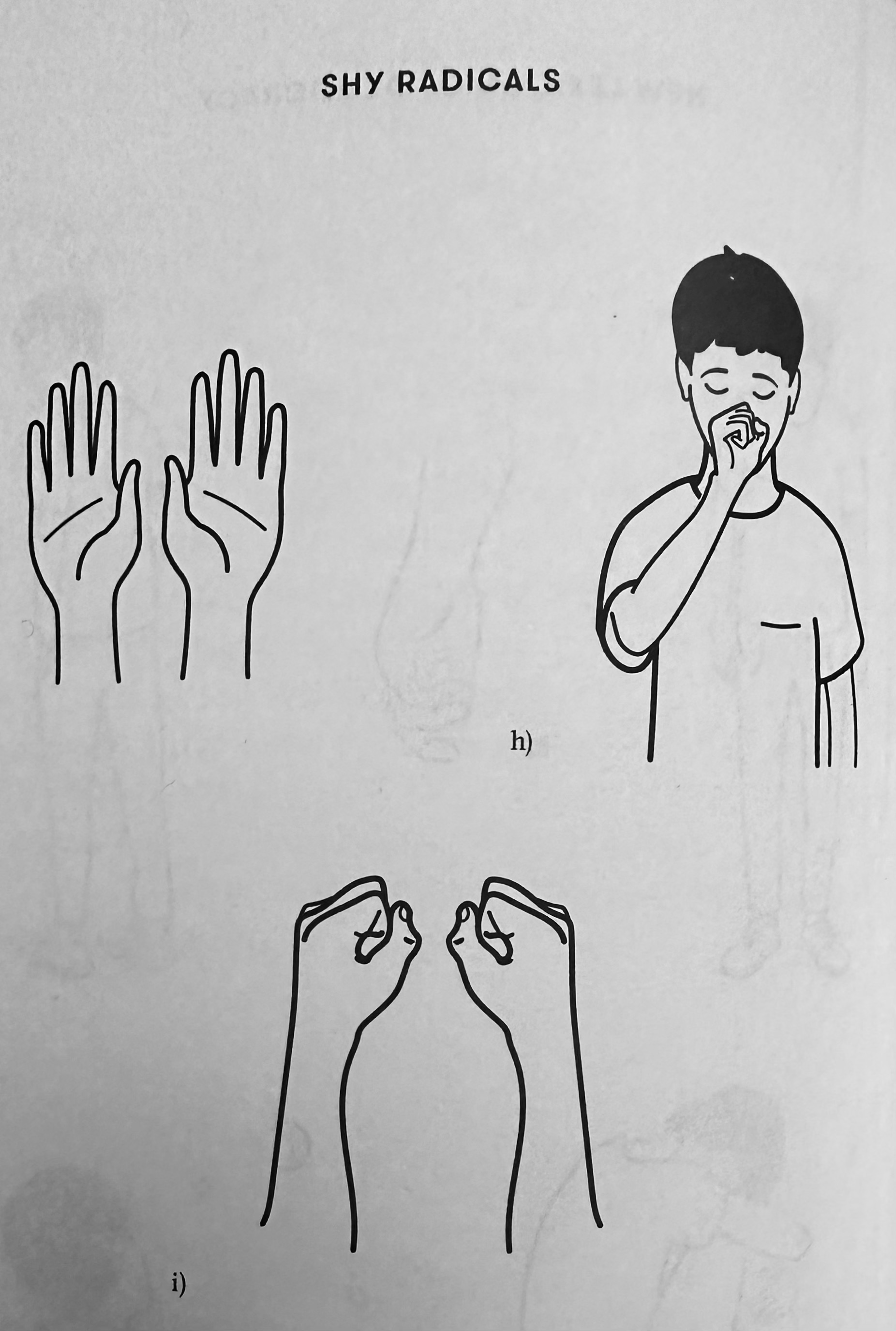

Hamja Ahsan: My book Shy Radicals has inspired a trail of other artworks, other collectives around the world which take concepts from the book and vocabulary. Among these is the artist Ipek Burçak, who's from Turkey and based in Germany. The utopic homeland I imagined, called Aspergistan, makes an appearance in her book The Autistic Turn. Ipek was based in Kassel in Germany and just wrote to me randomly. So it's not the case that I'm curating or commissioning, it's sort of self-generative, almost cellular. Sarah Browne made this beautiful film called Echo’s Bones set in the landscape of Ireland with younger people with autism and she's got a story from Samuel Beckett, rereading Samuel Beckett via neurodiversity, which I find quite interesting. We'll be speaking together about all the landscapes which appear in all these various works. There's taking landscapes in the imaginary way, in the virtual way…
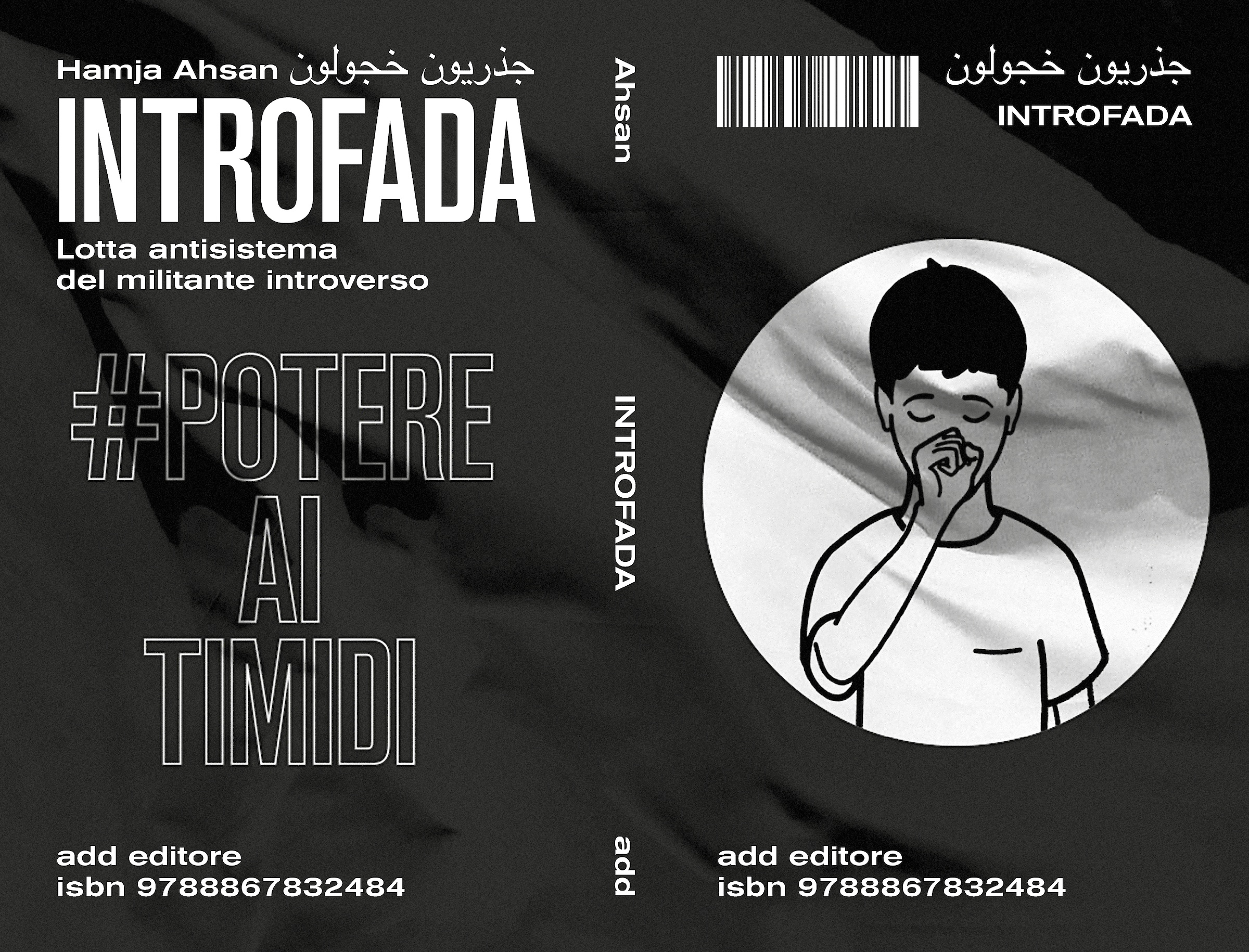
AL: I have the book [Shy Radicals] here and I've been reading it over the past days. I recognize a lot of the resentments that you describe in it, especially after graduating from university and realizing I have to market myself and all that. I was wondering, because a lot of art institutions are starting to work with neurodivergence as a topic and we've also been doing it for three years. You have a section about curating a film program in the book, but how do you imagine cultural events and talks to ideally look in Aspergistan?
HA: I don't fit into some of the social networking of contemporary art. I generally don't go to private viewings, I don't like opening Ceremonies, the sort of ostentatiousness of big biennials… Aspergistan has existed in me probably since the days of playground bullying and imagining in your heart that there could be another place. I find the aspect of the noisy playground sort of reoccurs in other places and also hierarchies. The book presents a serious utopic constitution, but within that it also draws on the language of teen movies. I re-watched old Winona Ryder films and 80s teen movies to look at the power structures, and those replicate themselves in the art world. There is a mean girls table in the art world. I was attracted to art because I liked the silences of galleries and this self-absorption, something that was outside of the noisy playground. You'll see it again in Sarah's film, when the children engage in parallel play. They walk around the basketball court in their own ways and find those torturous and depressive aspects of the high school experience which also replicate themselves in the art world and the workplace.
AL: I was also thinking in a very practical sense, since we are organizing an event, a talk, how do we do it right so that it's actually a pleasant experience?
HA: I think it will be nice because of the space, with the cats, that automatically makes it different.
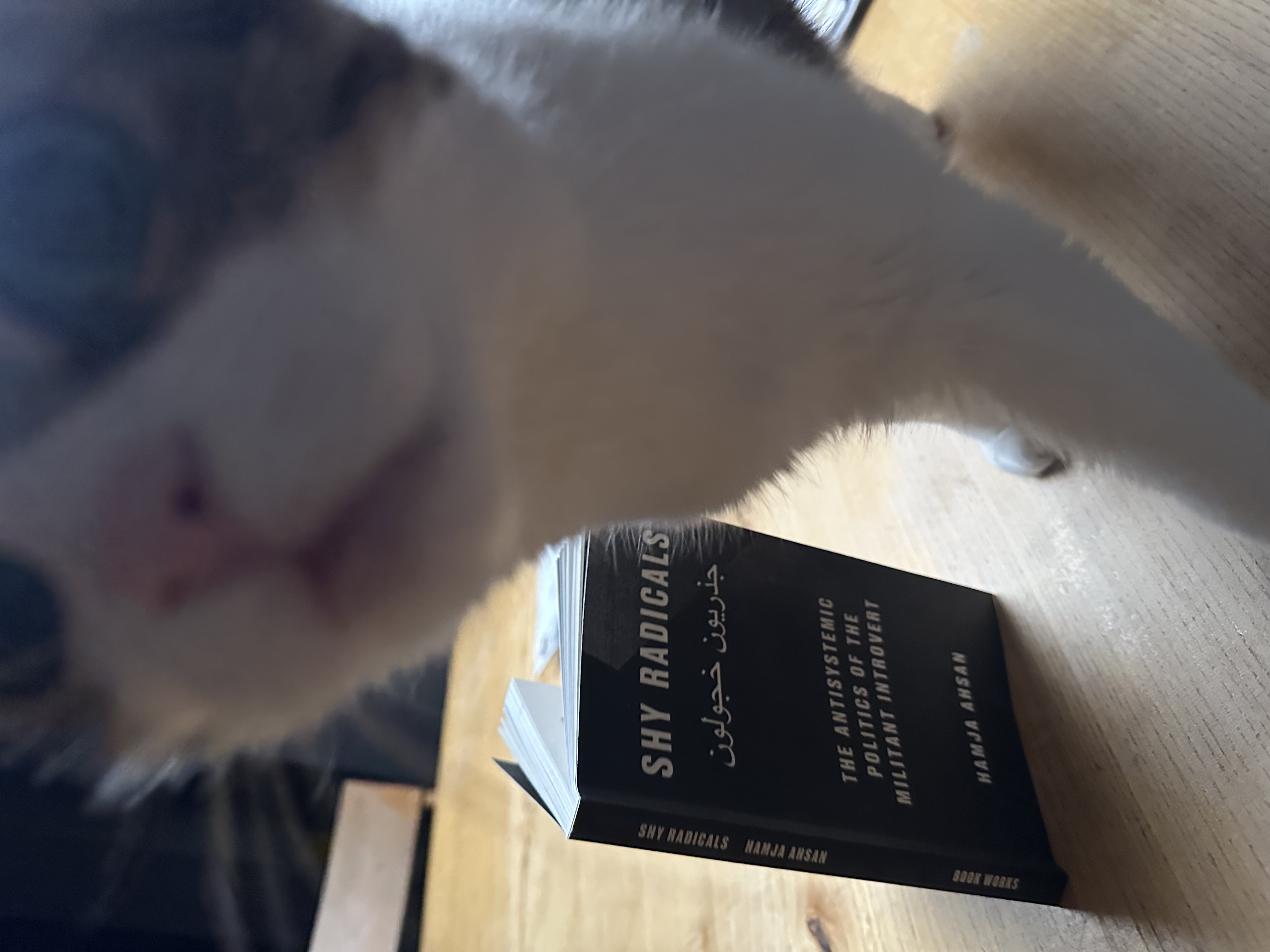 white in conversation with Hamja
white in conversation with Hamja AL: This event will not be about Shy Radicals. You proposed Trauma, solidarity and chicken as the topic.

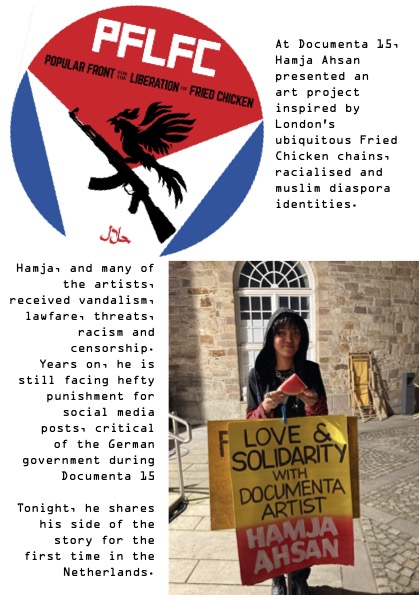
HA: I was in documenta15 and it was probably one of my most repressive experiences racially and institutionally. There are still many unresolved problems within German society around McCarthyism and repression and xenophobia, and all that came together in documenta. I feel like my side of the story has never been fully told. There was an attempt to create a counter-hegemonic narrative of documenta15 at Framer Framed in Amsterdam where I was spoken about but wasn't allowed to speak for myself, so I find that ethically wrong, and the bits where they spoke about me were also cut from the online publishing of it for whatever reason. And it's not just the art world, you can look at the way Germany treated Greta Thunberg, you had like six different newspapers trying to ruin her and damage her, although she's far more resilient than that. I find her quite a heroic figure.
I don’t like some of the new canon of neurodiversity, like Judy Singer who is credited with coining the term, although it’s far more contested and was developed through 90s internet forums. She’s an awful person, really racist, anti-muslim, just look at her twitter account. There’s the academic discourse around Nick Walker, Robert Chapman… but I love Greta Thunberg. And the sort of vernacular use of neurodiversity is more about an intuitive sense of friendship between people. I've certainly developed friendships and social networks in a different way through that term. Some of my friends organize neurodivergent gatherings, but they have no idea about this academic discourse. It's almost a unity of people who experience disadvantage. In terms of employment, income, there's a disproportionality of low pay. My friends who I bond with are often people who didn't develop in a straight line in the way others did. And just not feeling collective shame and stigma for things like never having earned an average adult salary. Although that is the case for 99 percent of artists anyway.

I’ve also been thinking about creating a speculative organization called Neurodivergents Against Genocide and Apartheid, spelling NAGA, because during the current genocide in Gaza there were murders — Mohammed Bhar was probably the most high profile, he was a young man with autism and down syndrome who was attacked by an IDF dog. He was actually quite trusting towards the dog and it ended up killing him.


Hamjah with Mohammad Dhar signs / Autistic Lives Matter sign
Other cases are the killings of Fulla Masalmeh and Eyad al-Hallaq, with no accountability. Within the huge street mobilizations since the genocide unfolded, sometimes a million or half a million people, there are sub-groups, which is where NAGA would be situated. I used to actually cut and carry a big placard of Mohammed Bhar’s photograph across on the demo and write #autisticlivesmatter. I lost studio in October 2024, when my residency at WIP Space studios ended, and was too poor to rent a new one. So I have less space to make these things, but it's something I'd like to do for the future certainly, developing that into some sort of series of slogans and banners on those demos.
I unintentionally developed this huge collection archive of neurodiverse zines, which I represented again at the academy in Amsterdam recently. I realised oh, have I got the world's only and first neurodiversity zine archive? Probably yes! I also collected zines around ADHD and bipolar disorder, dysbraxia, the health service and diagnosis institutionalization…
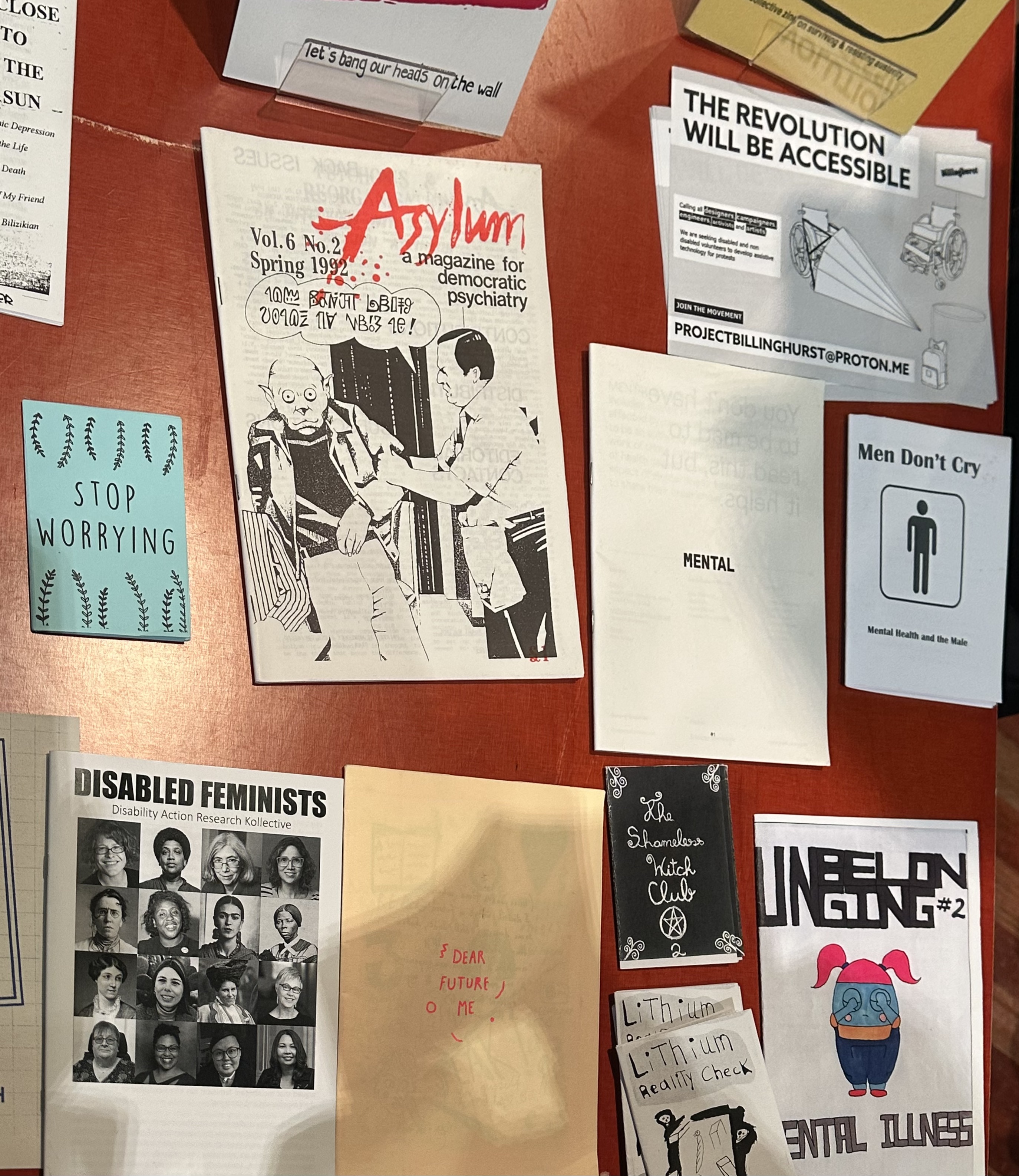
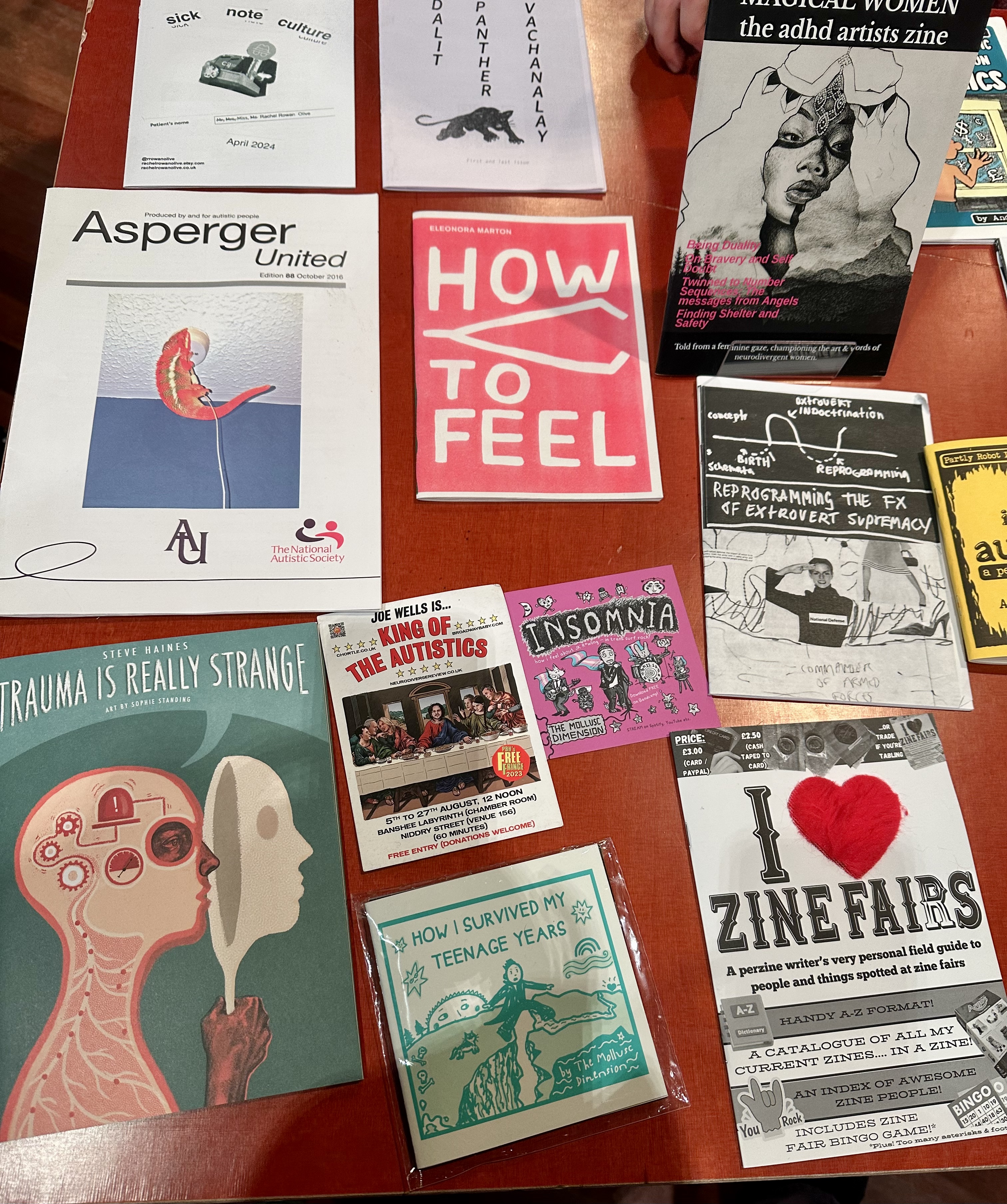
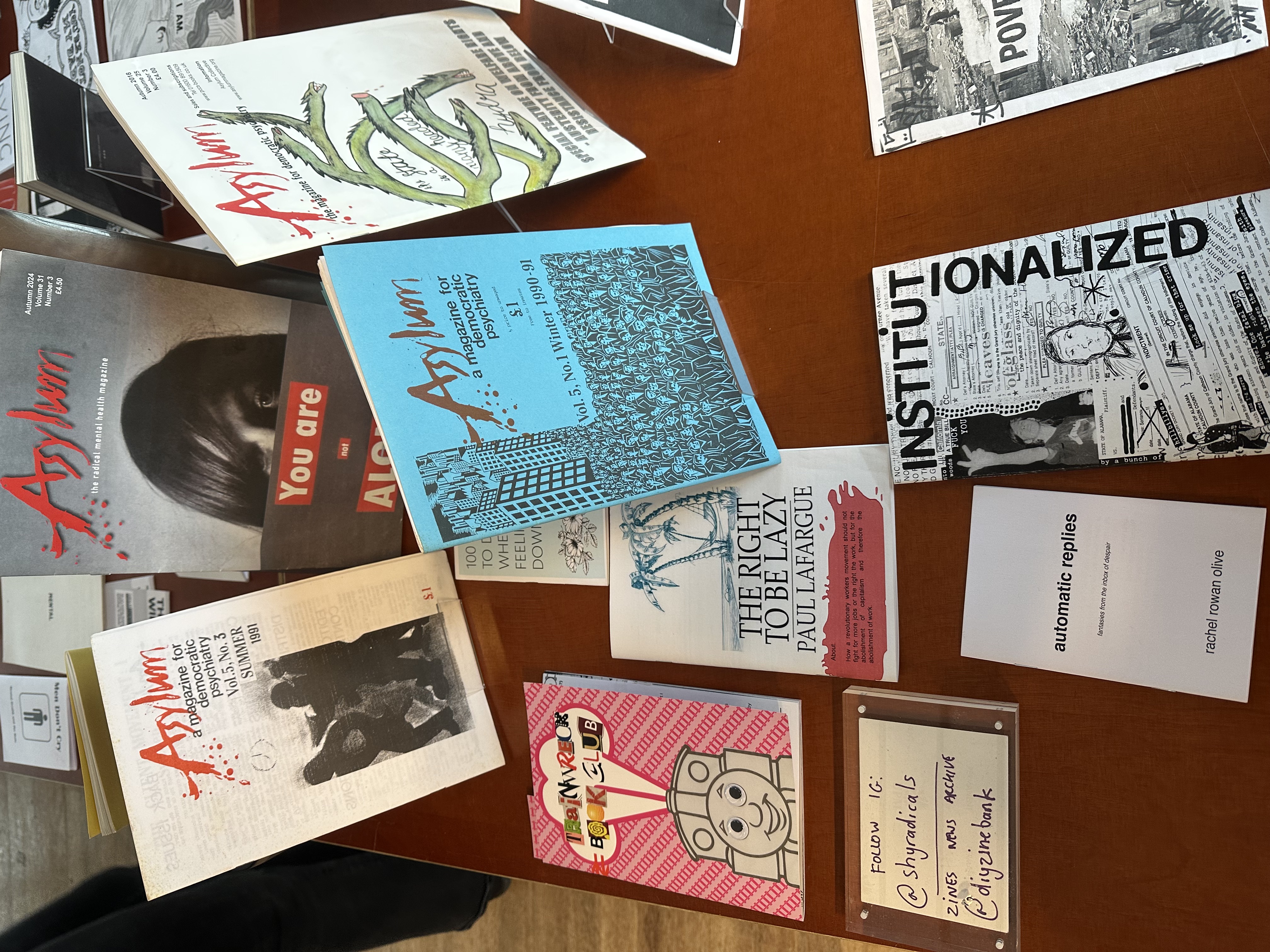
AL: Yes, I heard that you left with a whole suitcase full of zines the last time um that you were around here. Where does your passion for the zine medium come from and what can people expect from the workshop that you're going to host with us?
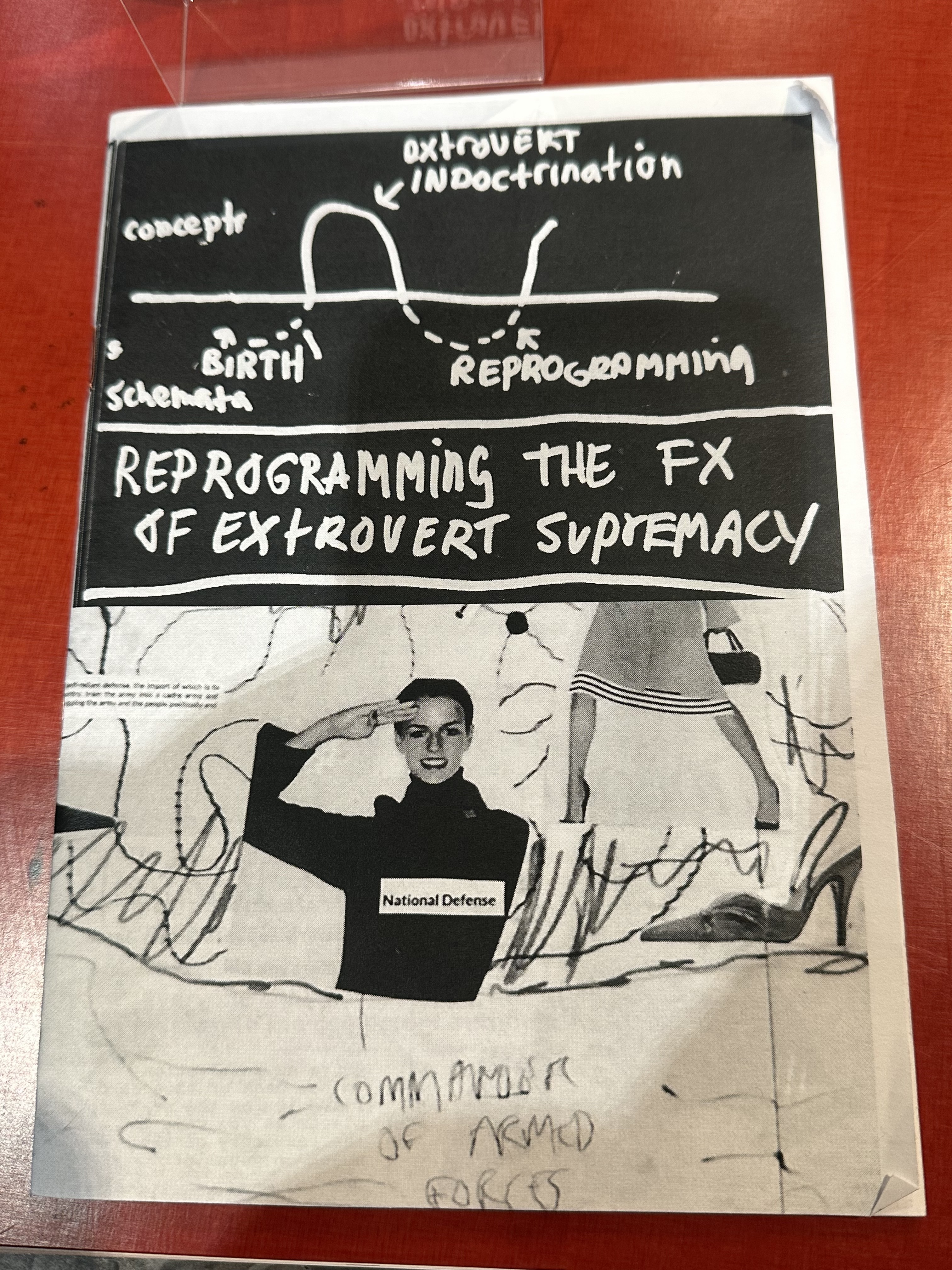
HA: I've been collecting zines since the early 1990s. I made my first zine in 1994. It was inspired by a figure called Richey Edwards from the band Manic Street Preachers who retrospectively gets identified as autistic these days, but spoke about other forms of vulnerability, depression and eating disorders. He eventually disappeared in the mid-1990s and now he's declared dead, and that inspired a huge zine culture around him. He had quite a cult following. Also Riot Grrrl zines, because my brother got the first bikini kill album. So that was the first phase. And then zines had a revival in the last 10 years. I got back into zine culture maybe 10-15 years later in a big way, when I did an art collective called Other Asias in London with an artist from Lahore in Pakistan and we made a zine. We did this project called Redo Pakistan which was a newspaper store traveling from city to city, and we made zines as part of that journey. Then I started applying back for zine fairs — it was still a 99% White-dominated space, even in 2009-10. I made friendships and deals with the handful of people of color I met in the zine fair, and then I did DIY Cultures that re-centered other oppressions not written into the zine fair. My brother was detained without trial under war on terror for a number of years and I was involved in the Guantanamo Bay detainees return home, and those things weren't written into some of these anarchist spaces. There's often this economic segregation, because artists move into places with cheaper rent, which often tend to be migrant areas. You see this pattern again in Queens or Brooklyn, New York, where you have a large migrant community and a large art community, so it was about having affection for both worlds and also entrenched activist scenes...
About zines, some people just haven't connected with that side of themselves, they got so into adulting that they forgot the love of drawing or playing. Making the world more playful, but in a good, serious way. I feel like zines are all these various stages of life, like retirement, childhood, teen angst, and maybe a bit of grown-upness just to keep it running all at the same time. I find it quite endearing to meet older people who make their first zine. In Bradford Zine Fair one of the guys who ran it made his first zine at age 70. I've made a friend called Rahul Patel, he’s been making zines in University of the Arts London. He’s in his 60s and uses the zine culture — he's part of the staff network also very involved in our university’s Palestine solidarity movement, and he's a trade unionist, so he's very much using his zines to make a more just world. That's also the university I used to go to, and often things there are very much tied to managerialism and big grants. Maybe zines offer a more immediate and intuitive and improvised way of engagement.
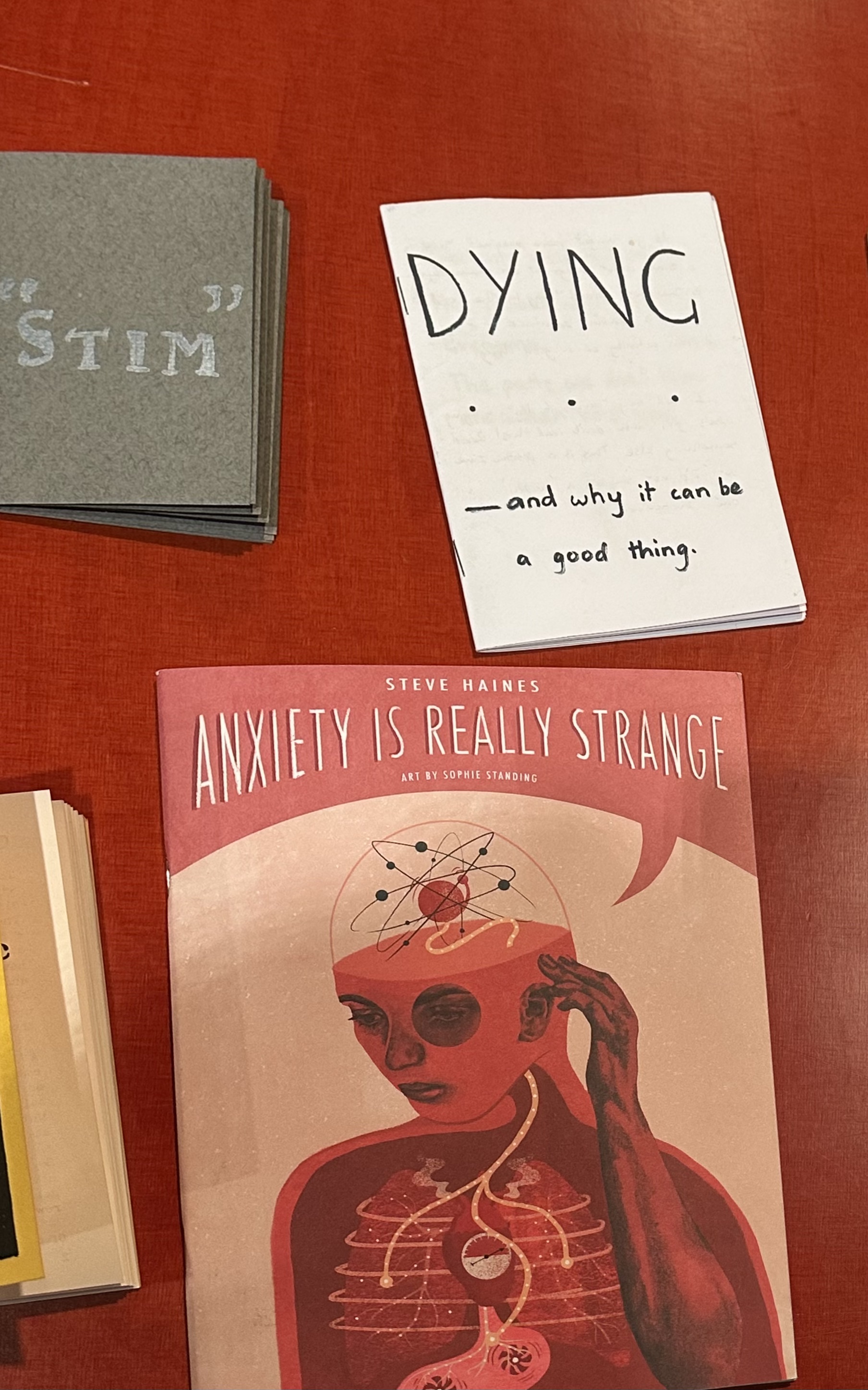
AL: What connects you to the Netherlands?
HA: The Netherlands have been very important to me. I think it's quite a special place, there are these state-subsidized art book shops, like PrintRoom in Rotterdam which is quite a special place and also Worm which I really like. I've been part of Rotterdam Zine Camp several years and I actually gave a talk about neurodiversities and zines there quite recently. Karin de Jong, who runs PrintRoom, I've called my adopted Dutch auntie. page not found have also been really good to me, they let me curate a season called Solitary Solidarity during the Covid crisis. I looked at artists in solitary confinement, my brother was also in solitary confinement, so we did a screening of Herman's House about imprisoned Black Panther Herman Wallace of the Angola 3, and artists and zine makers during the Covid pandemic and how they dealt with it. I invited Brett Blum from the Chicago Zine Collective, who was posting zines around the city during pandemic times and made a zine every day under lockdown. We've also done events at Perdu in Amsterdam. An event called I Love Psychiatrists with the poet Jonathan Griffioen and the poet Asha Karami, we were just reflecting on the dead Kurt Cobain. In Utero by Nirvana that was the first album I ever bought and I reflect a lot on Kurt Cobain's suicide even 30 years later because I remember it quite vividly. There was also a Japanese group who developed the choreography based on the gestures from Shy Radicals.
And I’ve been an artist in residence in at the Jan van Eyck Academy in Maastricht.

Hamja at Perdu with Jonathan Griffioen
AL: Actually this morning I read the articleyou wrote at one point for the Metropolis M magazine.
HA: Yes, I feel a bit strange because it's Ramadan now and I'm in a different place. I wrote that article and I think it's a good article and it's insightful - but I'm quite a spiritually fluctuating person. I left atheism in my 20s, but I still don't fit into various communities and I'm not the same person who wrote the article. But I'm not saying I will not not be that person ever again.
I don't know what it is exactly. If I'm living in another country — the last time I was a fully practicing person was when I was alone in South Korea. And when I was in the Academy I was also quite isolated, which actually made me more motivated to be observant and practicing. I don't know why that is, maybe some deep-seated psychological reason. I think people say it in a negative way, but I don't view that as a bad thing -- I think the only thing universal to all cultures is everyone is lacking in something. Everyone has something imbalanced or a color that's missing from the palette, so maybe if I was living in Saudi Arabia I wouldn't be practicing just to balance that space out, but if I was living in France I would probably be very practicing to balance out some of the excesses of the state secularism. In London there are a million Muslims, so…
Metropolis M asked me to write a follow-up article and they're very interested in my documenta experience. I started writing that article and sort of had a breakdown — when I was at documenta, for the first time I felt the rise of fascism which is now 20% of the electorate in Germany. I would get a flood of hatred every single day. And there's no institutional mechanism of people listening or representing your experiences. I still feel very aggrieved and injured by the whole thing.The next documenta cycle will be in 2027, and there are already discussions around whether Germany is really the place where artists can test ideas. A very high percentage, I think even a fifth of the audience of documenta, three quarters of a million people at the last one, is from the Netherlands. So the Netherlands are quite an important forum for having that discussion. That was part of the reason I couldn't finish the article. There are fragments, broken fragments in various podcasts and vlogs of this very traumatic experience, but I think there's some complicity in some of the institutions upholding the dominant narrative. It's still something I feel the immediate need to speak about. And it hasn't ended for me because there was an attempted lawsuit against me.

Hamja at London Palestine Demos with Artist Union England
So first, the new CEO shut down one of my Instagram accounts and threatened me. It gets really ridiculous. The curators of documenta, ruangrupa, the Indonesian collective - some of whom are based in the Netherlands, like Reza and Iswanto - they liked one of my Instagram posts, that was it. And it's just some Arabs singing “Palestine will be free” in the streets of Berlin. And that generated something like two dozen headlines in the German press. Then the Documenta's institution wrote this really long statement where they, I don't know, somehow linked us to ISIS and Hamas, which is awful.
So then ruangrupa had to apologize, unlike my post and do a whole public relations thing just about liking a post. And I feel like what happens in Germany could be exported elsewhere.
So the first thing that happened was that the fascist party, the AFD, made this anti-BDS motion against boycott, divestment and sanctions, which the whole parliament adopted. And there was an attempt to introduce that into the UK. I just don't see how an international arts space can function, expecting everyone to be in line with German foreign policy. And that being a prerequisite to doing anything. Everyone is being persecuted or cancelled to silence. There's this group called Archive of Silence, and it has over 200 cancellations of people. I mean, the last person who was silenced at a really high profile level was the United Nations Special Rapporteur Francesca Albanese.
All my friends and people I've curated, like the German Jewish filmmaker Dror Dayan, he's going through the courts now. Shahidul Alam, a Bangladeshi curator I’ve worked with, had an entire photography Bienniale cancelled over a Palestine Facebook post. In some way, it's a royal honour, it's all the best people in the world. Like if you look at the people in Archive of Silence, like Laurie Anderson, Naomi Klein, all the best artists are being cancelled or silenced. Britain's not as bad as Germany, but I don't know. I feel like it's a very urgent thing that needs to be addressed.

The zine community has been quite supportive. Like the riso printers, page masters, who give out free riso prints to Palestine activists. And if you go to the student encampments in Goldsmith and other places, they always have a zine library. Zine making is part of the activities of on-site resistance. I started a hashtag zinesforPalestine in Germany, actually. One of the main zine fairs was really pro genocide. It was quite grim. And the person ended up trolling and, I don't know, just attacking me. So even in the world of zines, this current crisis is reflected.
AL: I also wanted to ask about what initially drew you to fried chicken and why you wanted to celebrate it. Which I think the Metropolis M article goes into a little bit. And it was actually sad to read, because it had this hopeful tone about going to documenta.
HA: It’s quite sad. The whole thing's quite tragic. It's something you look forward to when you get selected. It's the peak of someone's career. And now it's turned into a bit of a prolonged nightmare. It hasn't ended.
www.theartnewspaper.com/2024/06/12/british-artist-faces-criminal-investigation-in-germany-over-social-media-posts
I got prosecuted months after Documenta ended, and that hasn't ended over 2 years later. It was for two facebook comments on my personal account from August 2022, opinons I wrote when living in London, England, when commenting on the British Newspaper The Guardian and The Daily Telegraph, calling British Prime Minister Boris Johnson and German Chancellor Olaf Scholz " two pigs" and "neoliberal fascist pig", because I saw both as corrupt authoritarians. This did not break British law or even facebook's own community policy. But it got me and the second half of my public programme at Documenta deplatformed. Three events, a panel discussion on Islamophobia called Radical Chicken with top German academic Dr. Jennifer Phillipa Eggbert, writers Miko Peled, Tate academic Hassan Vawda, and artist Navine Khan-Dossos, a 2nd screening of the Shy Radicals movie and a 2nd big open Chicken feast at the Fridericianum Museum. I felt frightened for the speakers’ safety after the flood of violent threats and racist abuse I got when German sensationalist tabloid BILD and the AfD publicly incited against me. Later, tweet replies to an FDP politican who was lead speaker at intimidating Israel-aligned mob street rallies outside the main Documenta Exhibition venues, wanting to shut down the exhibition. On his social media he said he wanted me silenced due to my support of Palestine BDS solidarity. He posted about me three times a day on the day of my public event with a zipped-up mouth. In one of the tweet’s replies, I refered to him as an "Apartheid lackney" due to his McCarthyist desire to ban me from speaking. The prosecutor initially wanted to fine 12,000 euros - if you don't pay it, it turns into a prison sentence. It feels like giving money to someone who bullied you or your abuser. So I'm actually very disturbed, shaken and distressed. I am very poor, precarious, I haven't got that type of money. A fundraiser was made for my legal fees, where Turner Prize winners Jasleen Kaur and Tai Shani donated. It’s also to replatform my cancelled panel at a future date, and publish future zines on my experiences.
LINK HERE https://www.gofundme.com/f/solidarity-with-artist-hamja-ahsan-fund
So I don't know. I haven't got that type of money. And it just doesn't end because every week another person who I know personally is prosecuted or canceled or silenced. .
> Surving Documenta :
Trauma, Solidarity and Chicken
Trauma, Solidarity and Chicken
FRIED CHICKEN SALON
with Hamja Ahsan & friends
monday
24 march
18:00-22.00
